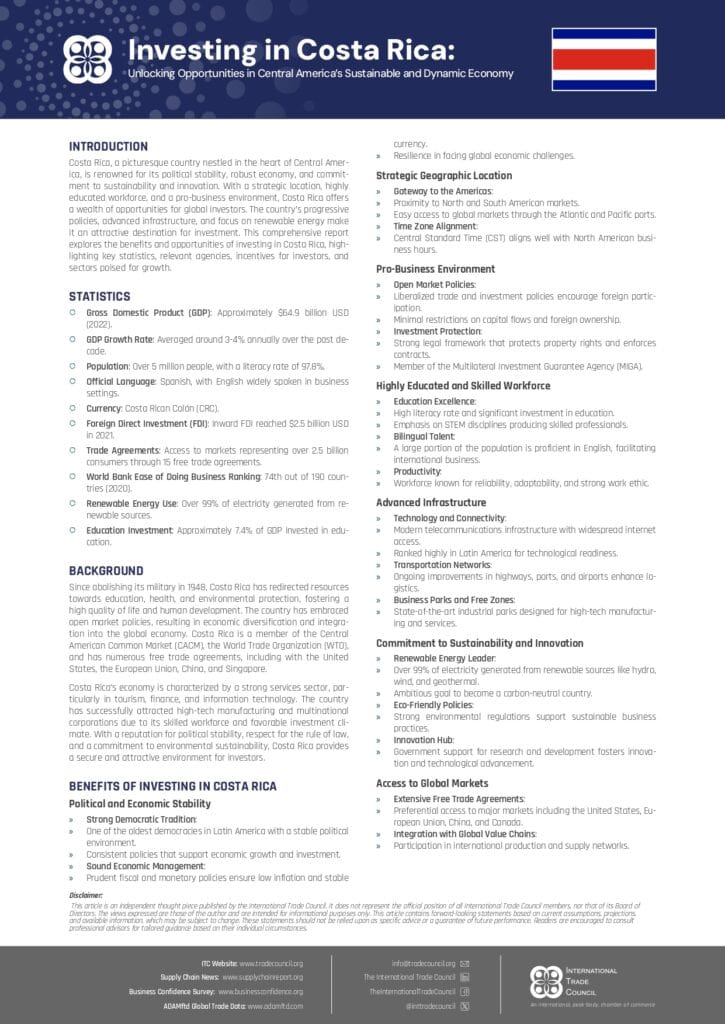- Type of Government: Presidential republic
- Population: Approximately 5.2 million
- GDP: Around $95 billion USD
- Corporate Tax Rate: 30%
- Personal Income Tax Rate: Progressive, up to 25%
- Major Exports: Medical devices, bananas, pineapples, coffee
- Major Imports: Machinery, petroleum products, electronics
Doing Business with Costa Rica
A comprehensive guide to doing business, exporting, investing, and manufacturing in Costa Rica.
Exporting to Costa Rica involves several steps to ensure compliance with regulations. Here’s a detailed guide:
-
Conduct Market Research
- Analyze demand for your product in Costa Rica.
- Understand the competitive landscape and regulatory requirements.
-
Verify Product Compliance
- Ensure your product meets Costa Rican standards and regulations.
- Check if specific certifications or permits are required.
-
Check Tariffs and Duties
- Review applicable import duties and taxes for your goods.
- Utilize any trade agreements that may apply.
-
Arrange Logistics and Shipping
- Choose a reliable shipping company experienced with Costa Rican imports.
- Ensure all shipping documents, such as bills of lading, are completed accurately.
-
Prepare Documentation
- Include commercial invoices, packing lists, and certificates of origin.
- Ensure compliance with Costa Rican customs requirements.
-
Customs Clearance
- Work with a customs broker to facilitate the clearance process.
- Pay any duties and taxes required for import.
-
Distribution and Sales
- Establish distribution channels within Costa Rica.
- Consider partnerships with local businesses for effective market penetration.
Key Contacts
Importing goods into Costa Rica involves several steps to ensure compliance with regulations. Here’s a detailed guide:
-
Register Your Business
- Ensure your business is registered with the Costa Rican authorities.
- Obtain a tax identification number (TIN).
-
Classify Your Goods
- Use the Harmonized System (HS) codes to classify your goods accurately.
-
Verify Import Regulations
- Check if your goods require special permits or certifications.
- Contact relevant authorities for specific product requirements.
-
Check Tariffs and Taxes
- Identify applicable import duties and taxes for your goods.
- Review any trade agreements that may reduce tariffs.
-
Arrange Logistics and Shipping
- Select a reputable shipping company.
- Ensure all shipping documents, such as bills of lading and invoices, are completed accurately.
-
Prepare Import Documentation
- Include commercial invoices, packing lists, and certificates of origin.
- Ensure compliance with Costa Rican customs requirements.
-
Customs Clearance
- Work with a customs broker to facilitate the clearance process.
- Pay any duties and taxes required for import.
-
Receive and Distribute Goods
- Arrange for the delivery and distribution of goods upon clearance.
- Set up local partnerships if needed.
Key Contacts
- Customs General Directorate (Direccià³n General de Aduanas)
- Website: Customs General Directorate
- Procomer (Costa Rican Foreign Trade Promotion Agency)
- Website: Procomer
Incorporating a company in Costa Rica involves several key steps. Here’s a detailed guide:
-
Choose a Business Structure
- Decide on the type of company: Limited Liability Company (LLC), Corporation (S.A.), etc.
-
Select a Business Name
- Ensure your company name is unique by checking the National Registry.
-
Draft Articles of Incorporation
- Prepare the Articles of Incorporation with a notary public.
-
Open a Bank Account
- Open a corporate bank account in Costa Rica to deposit initial capital.
-
Register with the National Registry
- Submit incorporation documents to the National Registry.
- Obtain a corporate identification number (Cà©dula JuràÂÂÂÂdica).
-
Register for Taxation
- Register your company with the Tax Authority (Ministerio de Hacienda) for a tax identification number.
-
Social Security Registration
- Register your company with the Costa Rican Social Security Fund (CCSS) for employee benefits.
-
Obtain Necessary Licenses and Permits
- Depending on your industry, apply for specific permits from local municipalities.
Costs
- Notary Fees: Vary depending on the complexity of the documentation.
- Registration Fees: Typically range from $500 to $1,000 USD.
- Additional Fees: May include legal and administrative costs.
Key Contacts
- National Registry (Registro Nacional)
- Website: National Registry
- Tax Authority (Ministerio de Hacienda)
- Website: Ministerio de Hacienda
- Costa Rican Social Security Fund (CCSS)
- Website: CCSS
Setting up a manufacturing plant in Costa Rica involves several important steps. Here’s a detailed guide:
-
Conduct Market Research
- Analyze local demand and industry trends.
- Evaluate potential competitors and supply chain logistics.
-
Choose a Suitable Location
- Identify industrial zones with necessary infrastructure.
- Contact local government or industrial parks for available sites and potential incentives.
-
Register Your Business
- Incorporate your company through the National Registry.
- Obtain a corporate identification number (Cà©dula JuràÂÂÂÂdica).
-
Obtain Necessary Permits
- Apply for construction, environmental, and zoning permits.
- Contact local municipalities for specific requirements.
-
Secure Financing
- Explore funding options through banks or investment agencies.
- Consider government incentives for manufacturing.
-
Design and Construct the Facility
- Hire architects and contractors familiar with local regulations.
- Ensure compliance with building codes and safety standards.
-
Install Equipment and Machinery
- Import necessary machinery, ensuring compliance with local regulations.
- Coordinate with customs for smooth importation.
-
Recruit and Train Staff
- Hire local talent and provide necessary training.
- Contact local employment services for assistance.
-
Register for Taxation and Social Security
- Ensure your business is registered with the Tax Authority and the Costa Rican Social Security Fund (CCSS).
-
Begin Operations
- Ensure all systems are in place and test the production line.
- Implement quality control measures.
Key Contacts
Registering a trademark in Costa Rica involves several steps to ensure legal protection. Here’s a detailed guide:
-
Conduct a Trademark Search
- Check the availability of your trademark through the Costa Rican Intellectual Property Registry.
-
Prepare Your Application
- Gather necessary information: trademark design, goods/services classification, and applicant details.
-
Submit Your Application
- File the application with the National Registry’s Intellectual Property Office.
-
Pay the Application Fee
- Fees vary; contact the Intellectual Property Office for specific costs.
-
Examination Process
- The office reviews the application for compliance and any conflicts.
- Respond to any objections or requests for additional information.
-
Publication and Opposition
- If approved, the trademark is published for opposition.
- There is a period for third parties to oppose the registration.
-
Registration and Certification
- If no oppositions arise, the trademark is registered.
- Receive a certificate of registration.
-
Maintain and Renew the Trademark
- Trademarks are valid for 10 years and can be renewed indefinitely.
- Submit renewal applications before expiry to maintain protection.
Costs
- Application Fee: Contact the Intellectual Property Office for current rates.
- Renewal Fee: Contact the Intellectual Property Office for specific costs.
Key Contacts
- National Registry – Intellectual Property Office
- Website: National Registry
- Ministry of Economy, Industry, and Commerce (MEIC)
- Website: MEIC
Resolving commercial disputes in Costa Rica involves several steps and options. Here’s a guide on the process:
-
Attempt Negotiation
- Begin by negotiating directly with the other party to find an amicable solution.
-
Mediation
- Engage a mediator to facilitate discussions.
- Mediation is often quicker and less formal than court proceedings.
-
Arbitration
- Consider arbitration as a private dispute resolution method.
- Arbitration can be faster and confidential.
-
Seek Legal Advice
- Consult with a lawyer specializing in commercial law for guidance on your case.
-
File a Lawsuit
- If other methods fail, file a lawsuit in the relevant Costa Rican court.
- Prepare necessary documentation and evidence.
-
Court Proceedings
- Attend hearings and present your case.
- Follow the legal procedures as guided by your attorney.
-
Judgment and Enforcement
- If a judgment is made, ensure its enforcement through legal channels.
Costs
- Mediation and Arbitration Fees: Vary depending on the service provider.
- Court Filing Fees: Depend on the jurisdiction and case type; consult local courts.
- Legal Fees: Vary based on the lawyer and complexity of the case.
Key Contacts
- Judicial Power of Costa Rica
- Website: Judicial Power
- Ministry of Justice and Peace
- Website: Ministry of Justice
When considering doing business in Costa Rica, it’s important to understand various factors that can influence operations. Here’s an overview:
Social and Cultural Factors
- Language and Communication
- The official language is Spanish. English is commonly used in business settings.
- Building relationships and trust is vital in business interactions.
- Business Etiquette
- Punctuality is valued, but meetings may not start on time.
- Networking and personal relationships play a key role.
Political Environment
- Government Structure
- Costa Rica is a stable presidential republic.
- Known for its political stability and democratic governance.
- Regulatory Environment
- The regulatory framework is business-friendly, but staying updated on changes is crucial.
- Foreign investment is encouraged, with transparent processes.
Economic and Foreign Exchange Factors
- Currency
- The currency is the Costa Rican Colà³n (CRC).
- Exchange rates can fluctuate; understanding currency risks is important.
- Investment Climate
- Key sectors include tourism, agriculture, and technology.
- The country is a hub for eco-friendly and sustainable businesses.
Rule of Law
- Legal System
- Based on civil law influenced by Spanish legal traditions.
- Strong protection of property rights and contract enforcement.
- Intellectual Property
- IP laws are well-developed; protection is consistent.
Infrastructure
- Transportation and Logistics
- Well-developed infrastructure, with ongoing improvements in roads and ports.
- Strategic location for access to North and South American markets.
Relevant URLs
- Procomer (Costa Rican Foreign Trade Promotion Agency)
- Ministry of Economy, Industry, and Commerce (MEIC)
- Judicial Power of Costa Rica
Ask our Experts on Doing Business in/with Costa Rica
If you’re looking to do business or invest in Costa Rica, we can provide expert guidance, market insights, and valuable connections to help you navigate the local landscape. Contact us today to discover how we can assist in making your venture a success.
Join the Global Network of International Trade Experts
Expand your business opportunities, connect with like-minded professionals, and gain access to exclusive resources. Become a member of the International Trade Council and start making a global impact today.












